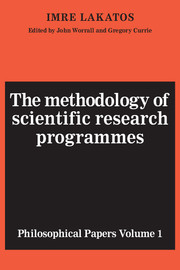Book contents
- Frontmatter
- Contents
- Editors' introduction
- Introduction: Science and pseudoscience
- 1 Falsification and the methodology of scientific research programmes
- 2 History of science and its rational reconstructions
- 3 Popper on demarcation and induction
- 4 Why did Copernicus's research programme supersede Ptolemy's?
- 5 Newton's effect on scientific standards
- References
- Lakatos bibliography
- Index of names
- Subject Index
5 - Newton's effect on scientific standards
Published online by Cambridge University Press: 05 June 2012
- Frontmatter
- Contents
- Editors' introduction
- Introduction: Science and pseudoscience
- 1 Falsification and the methodology of scientific research programmes
- 2 History of science and its rational reconstructions
- 3 Popper on demarcation and induction
- 4 Why did Copernicus's research programme supersede Ptolemy's?
- 5 Newton's effect on scientific standards
- References
- Lakatos bibliography
- Index of names
- Subject Index
Summary
THE JUSTIFICATIONIST HIGH ROAD TO PSYCHOLOGISM AND MYSTICISM
(a) Justificationism and its two poles: dogmatism and scepticism
Schools in the theory of knowledge draw a demarcation between two vastly different sorts of knowledge: episteme, that is, proven knowledge, and doxa, that is, mere opinion. The most influential schools – the ‘justificationist’ schools – rank episteme exceedingly high and doxa exceedingly low; indeed, according to their extreme canons only the former deserves the name ‘knowledge’. To quote a leading seventeenth century justificationist: ‘For with me, to know and be certain is the same thing; what I know, that I am certain of; and what I am certain of, that I know. What reaches to knowledge, I think may be called certainty; and what comes short of certainty, I think cannot be called knowledge.’ Or, as a twentieth century justificationist put it: ‘We cannot know a proposition unless it is in fact true.’ According to this school then, knowledge is proven knowledge, the growth of knowledge is the growth of proven knowledge, which, of course, is eo ipso cumulative. The dominance of justificationism in the theory of knowledge cannot be characterized better than by the fact that the theory of knowledge came to be called ‘epistemology’, the theory of episteme. Mere doxa was not deemed worthy of serious investigation: growth of doxa was regarded as a particularly absurd idea, since in the orthodox justificationist view, the hallmark of progress was the increase of rational episteme and the gradual decrease in irrational doxa.
- Type
- Chapter
- Information
- The Methodology of Scientific Research ProgrammesPhilosophical Papers, pp. 193 - 222Publisher: Cambridge University PressPrint publication year: 1978
- 13
- Cited by



